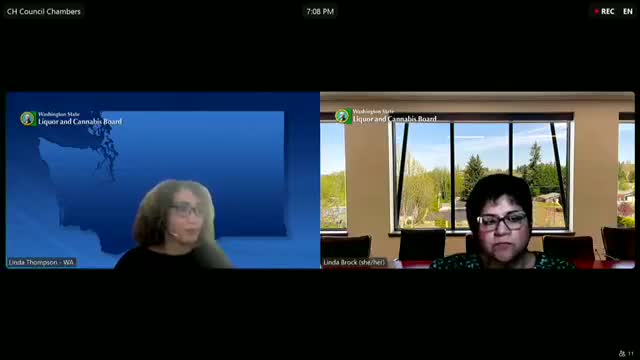Lynnwood Council discusses cannabis licensing and potential zoning changes
June 16, 2025 | Lynnwood, Snohomish County, Washington
This article was created by AI summarizing key points discussed. AI makes mistakes, so for full details and context, please refer to the video of the full meeting. Please report any errors so we can fix them. Report an error »

Lynnwood City Council is taking significant steps to address the complexities surrounding cannabis licensing and zoning regulations during their work session on June 16, 2025. The council discussed the implications of social equity licenses and the need for a balanced approach to cannabis businesses within the city.
A key point of discussion was the allocation of seven social equity licenses, which are intended for Snohomish County rather than Lynnwood alone. This clarification is crucial as it shapes the landscape for potential cannabis businesses in the area. Council member Hurst highlighted the importance of engaging stakeholders, including current license holders, to ensure their perspectives are considered in future discussions.
The council also examined the necessity of security measures for cannabis businesses, such as the requirement for surveillance cameras. While the Washington State Liquor and Cannabis Board (LCB) sets certain standards, the city has the authority to impose additional requirements, which could enhance community safety and oversight.
Representative Lauren Davis provided insights into the legislative challenges surrounding cannabis regulation, particularly concerning the potency of products. She noted that public awareness of the potential health risks associated with high-potency cannabis is growing, which may influence future legislative efforts. Davis emphasized the need for municipalities to have the authority to regulate cannabis potency to protect public health.
Council members expressed concerns about the current zoning regulations that may inadvertently isolate cannabis businesses, limiting access for residents without transportation. Council member Coelho suggested reevaluating buffer zones to allow for a more equitable distribution of cannabis outlets throughout the city, rather than clustering them in specific areas.
As the council continues to navigate these discussions, the focus remains on creating a regulatory framework that balances community safety, public health, and equitable access to cannabis businesses. The next steps will involve further stakeholder engagement and potential adjustments to zoning laws to better serve the Lynnwood community.
A key point of discussion was the allocation of seven social equity licenses, which are intended for Snohomish County rather than Lynnwood alone. This clarification is crucial as it shapes the landscape for potential cannabis businesses in the area. Council member Hurst highlighted the importance of engaging stakeholders, including current license holders, to ensure their perspectives are considered in future discussions.
The council also examined the necessity of security measures for cannabis businesses, such as the requirement for surveillance cameras. While the Washington State Liquor and Cannabis Board (LCB) sets certain standards, the city has the authority to impose additional requirements, which could enhance community safety and oversight.
Representative Lauren Davis provided insights into the legislative challenges surrounding cannabis regulation, particularly concerning the potency of products. She noted that public awareness of the potential health risks associated with high-potency cannabis is growing, which may influence future legislative efforts. Davis emphasized the need for municipalities to have the authority to regulate cannabis potency to protect public health.
Council members expressed concerns about the current zoning regulations that may inadvertently isolate cannabis businesses, limiting access for residents without transportation. Council member Coelho suggested reevaluating buffer zones to allow for a more equitable distribution of cannabis outlets throughout the city, rather than clustering them in specific areas.
As the council continues to navigate these discussions, the focus remains on creating a regulatory framework that balances community safety, public health, and equitable access to cannabis businesses. The next steps will involve further stakeholder engagement and potential adjustments to zoning laws to better serve the Lynnwood community.
View full meeting
This article is based on a recent meeting—watch the full video and explore the complete transcript for deeper insights into the discussion.
View full meeting
